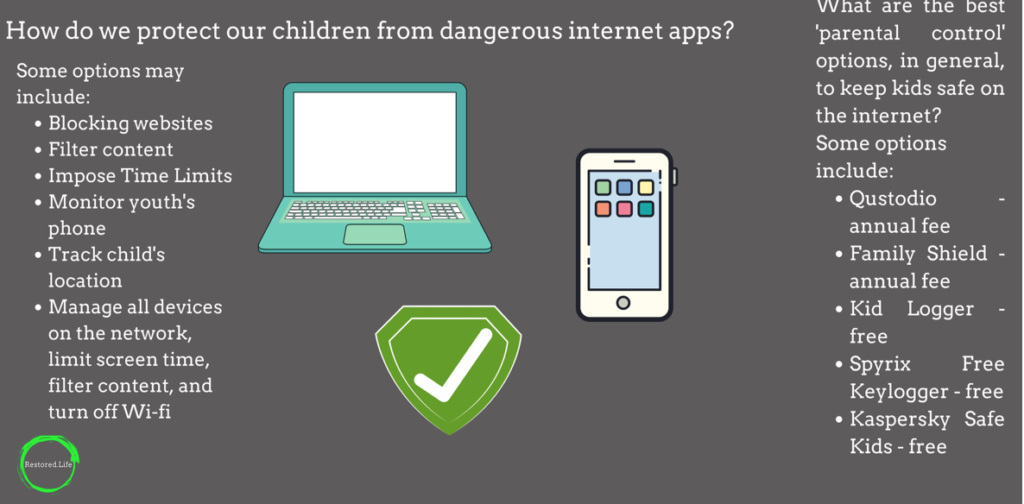Can ‘parental control’ software help recovering sex and porn addicts?
The short answer is “yes.” Parental control or accountability software can help sex and porn addicts. Individuals should look for key features when buying software, including customizable filtering, blocking, secondary filtering and blocking, time management, monitoring and reporting, and compatibility. Having others who you trust, like your sponsor or accountability partner, set and keep the password is best practice.
The complete answer is “maybe – and most likely yes.” The reason is that these are mostly “parental control” apps. Recovery is not about being patronized, parented, or controlled. It is about becoming more honest and transparent with people who support you in healthy ways. Therapists, sponsors, accountability partners, and spouses are likely supportive people. If any of these people take an attitude toward recovery that is patronizing or controlling, they are hurting more than they are helping.
For people in recovery, we recommend accountability functions over blocking functions because blocking functions may reinforce the habit of finding workarounds, whereas accountability reinforces transparency. We also recommend that the partner or spouse is not the person who receives the accountability reports or alerts. We’ll write more about this in future disclosure and recovery planning articles.
The rest of this article will focus on parental controls used with kids and teens as a preventative and protective tool. We also recommend that you read or subscribe to the blogs at Common Sense Media and Bark, as they write more regularly on these topics than we do.
General Parenting Tips about Devices and Internet Use
Your relationship with your kids is your NUMBER ONE TOOL for protecting them from harmful content and habits on the internet. To the extent you can, discuss these topics with your kids early, often, and with age-appropriate transparency into your own story.
The story of your own experiences and choices with the internet, good or bad, is a great teaching tool. It’s healthy to let your kids know that you have made mistakes, too. If you’ve been hurt, it’s good for them to know some of it (again, age-appropriateness is important). It is also healthy that you have spent some time either journaling or in therapy to process your story so that you can share it well.
What are the different types of ‘parental control’ options for inappropriate content?
- Blocking websites
- Blocking websites and filtering content
- Block websites, filter content, impose time limits
- Monitor youth’s phone
- Track child’s location
- Manage all devices on the network, limit screen time, filter content, and turn off Wi-fi
What are the best ‘parental control’ options, in general, to keep kids safe on the internet?
For kids who don’t drive yet: bark.us
For kids driving: covenant eyes, bark.us, or Accountable2you, depending on your relationship with your kid.
For adults in recovery: Don’t use “parental controls”! (see above)
How do parents prevent teens from sexting?
Educating your teen(s) on what sexting is and the reality of its prevalence and setting rules for internet and cell phone use with your teen(s) is key to helping prevent sexting. Talking about the consequences of sexting and making the conversation open to discuss the topic if a friend brings it up. Other forms of prevention include:
- Set an example: practice wise use of smart devices yourself.
- Don’t give your teen a cell phone with a camera (yes, minimalist phones really do exist).
- Use a phone safe, or have your kids turn in their devices at night.
- Develop responsibility by providing phone privileges based on maturity.
- Be aware of the motivations of kids who sext and the psychological factors involved.
- Set clear expectations.
- Warning your child or teen about the dangers of sexting.
- Have an account on any social network that your kids are on, and make sure you’re friended or following. Most important: ACTUALLY CHECK THEIR ACCOUNT.
- Occasionally review and open every single app installed on your kid’s devices. Some apps that are specifically for sexting or porn use disguise themselves as games, messaging apps, or navigation apps.
- Turn off wifi at night. Set things up with your mobile carrier to turn off mobile data at night.
- As a parent or caregiver, know the warning signs (see below).

What are the warning signs of a teen or child who is engaging in sexting?
- A child spends much time online or on the phone, specifically at night.
- Finding pornography on a child’s computer or suggestive photos on the phone.
- A child receives phone calls or texts from anonymous phone numbers.
- A child receives mail, gifts, or packages from someone you don’t know.
- A child turns off the computer or monitors quickly when you enter the room.
- A child becomes withdrawn from the family.
- A child is using an online account under someone else’s name.
Are there certain applications on smartphones that encourage unsafe sexual activity?
Basically, any app can be used to encourage unsafe sexual activity. While Snapchat was created specifically with sexting in mind, other apps have copied many of Snapchat’s original functionality.
Can parents set ‘parental controls’ on specific social networking sites like Snapchat and Tik Tok?
Yes, certain features like turning off the chat-room activities, restricting conversation to friends you know, and hiding your child’s profile when someone searches their name are a few different features you can use in either of these applications. Similarly, if there are specific individuals you don’t want your child or adolescent interacting with, you can block them completely. Another feature that may help set an app time limit on how much your child can spend on a certain application.
What is the best developmental age for a child to get a mobile device?
No matter what your kids or their friends say, we recommend kids don’t get smart mobile devices for dedicated personal use until they are driving. We recommend that your kids should have a job (or an agreed-upon level of school performance or extracurricular engagement) and pay for at least part of their monthly device bill. We also recommend that they “rent” the device from you; they do not buy it themselves. This maintains your role as an authority and guides how they will use your device. You could even take this concept as far as having a written lease agreement where you specify the rules that they must follow with your device.
Most youths get a phone around the age of 12 to 13 years old. We believe this is still too early, as they are especially vulnerable to the dopamine reward system in the brain. Generally, We lack social boundary-setting skills until later teen years. If you choose to get smart mobile devices for your kids at this age, we recommend that you have them turn in their devices for parent checks every night and that they are locked in a phone safe until morning. It can be useful to get a minimalist phone for your child to demonstrate appropriate behaviors with a lower-risk device at this age.
We strongly recommend against giving a child a phone or other dedicated smart device for personal use before the age of 12. We believe at this age, it is best that children use smart devices in public areas of the home, never in their room or another private area, with parent permission, and for no more than 90 minutes per day for entertainment or social purposes.
What are some tips for parents about protecting their children on mobile devices?
- Don’t succumb to pressure when your child asks for a phone at a young age.
- Teach children about social media, how it is not a popularity contest, and that their worth is not reflected in how many likes or comments they receive.
- Discuss and come together with other parents who are concerned about the use of smartphones in children.
Why is sexting dangerous?
There are many reasons why sexting is so dangerous. Here are a few reasons:
- Sexting constitutes child pornography
- It can involve bullying
- Exposes individuals to sexual predators
- Holds the risk of blackmail
- Sexts never go away
- Has reputation consequences
How prominent is sexting in youth?
Statistics may vary; however, some research indicates that at least one in seven teens engages in sexting.
How do you block inappropriate sites permanently?
Depending on your computer and browser, you can block websites so your children don’t view them.
Do I need to worry about my kid disabling parental controls on a digital device (s)?
Yes, children can undo parental controls. Being aware and vigilant if there is an indication that your child has been on the internet after you’ve turned off the network or if you get notifications that the parental control has been breached are key indicators that the child has found a way around the control.
